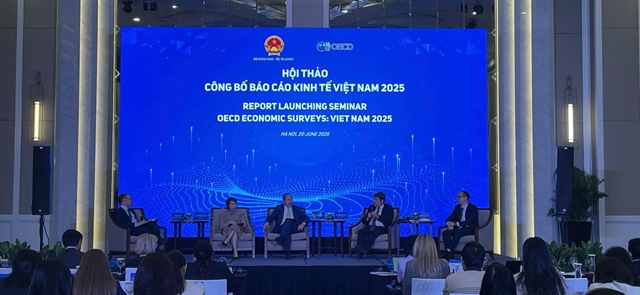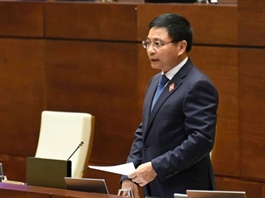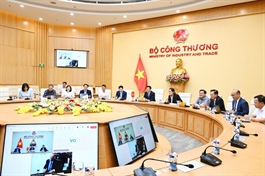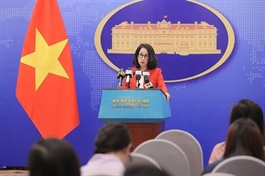Vietnam Economic Report 2025: OECD insights on sustainable growth strategy
Vietnam Economic Report 2025: OECD insights on sustainable growth strategy
The Ministry of Foreign Affairs, in coordination with the Ministry of Finance and the Organisation for Economic Cooperation and Development (OECD), hosted a seminar to launch the Vietnam Economic Report 2025 on June 20 in Hanoi.
The event gathered leaders from the Ministry of Foreign Affairs and Ministry of Finance, OECD representatives, ambassadors, and members of the diplomatic corps in Hanoi, along with delegates from Vietnamese ministries, economic research institutes, business associations, and major corporations.

The seminar also included a session on the theme “Harnessing trade and investment flows to enhance economic productivity”. Photo: Ha Vy |
Tran Bao Ngoc, director general of the Department of Economic Affairs under the Ministry of Foreign Affairs, highlighted the strong cooperation between Vietnam and the OECD, particularly in implementing an MoU and the related Action Plan for 2022–2026. The Vietnam Economic Report 2025 stands as a concrete result, reflecting the close and diverse cooperation between the two parties.
The Ministry of Foreign Affairs representative praised the efforts of the OECD team and the active collaboration from relevant Vietnamese ministries and agencies. She also expressed sincere thanks to the government of Japan for financing the report’s development, and to Australia for its partnership with Vietnam as co-chair of the OECD’s Southeast Asia Regional Programme (SEARP) for 2022–2025.
“Vietnam aims to achieve economic growth of over 8 per cent this year and move towards double-digit growth in subsequent years. To achieve this, we will continue to leverage traditional growth drivers such as exports, investment, and domestic consumption, while strongly promoting digital transformation, green economic development, productivity, and innovation,” said Ngoc.
Together with the 2020 Multi-dimensional Country Review and the Vietnam Economic Reports of 2023 and 2025, these publications serve as objective, valuable references for policymakers, researchers, and managers in both the public and private sectors in Vietnam, as well as development partners.
The report serves as a useful study tool for reviewing the implementation of the 2021-2025 socioeconomic development plan and continuing the rollout of the 2021-2030 socioeconomic development strategy.
Speaking at the event, Mathias Cormann, OECD secretary-general, commended Vietnam’s socioeconomic achievements, highlighting the country’s rapid economic growth, deep integration into the global economy, and notable successes in poverty reduction.
“Vietnam has made substantial economic progress over the past decades, marked by dynamic growth and a remarkable improvement in living standards. This is truly impressive. In 2023, real GDP per capita was 5.7 times higher than in 1990. Vietnam’s international economic integration since the late 1980s has been key to this success,” Cormann noted.
He also reaffirmed the OECD’s support and commitment to continuing to assist Vietnam in achieving its ambitious growth targets.
Presenting the report, Alvaro Pereira, OECD chief economist, said the Vietnam Economic Report 2025 focuses on Vietnam’s macroeconomic foundations, the impact of international integration on attracting foreign investment and international trade, and the outlook for developing a low-carbon economy. He praised Vietnam’s dynamism, entrepreneurial spirit, and ambition for prosperity. According to him, trade has been a major growth driver for Vietnam for decades and remains a cornerstone of its economic success.
The OECD report also provides recommendations for Vietnam to further advance towards a more integrated, transparent, sustainable, and inclusive economy.
Recommendations focus on the effective use of macroeconomic tools towards balanced fiscal policies and broadening the tax base; further strengthening monetary systems, credit policies, and interest rates; rational resource allocation; improving the efficiency of social welfare system, including wages, healthcare, and education; and enhancing the organisation of the informal economy and labour sector.
Additionally, the report urges the promotion of sustainable development through emissions trading systems and the development of renewable energy. It also draws from international experiences and suggests specific measures to attract high-quality investment, enhance domestic capacity, protect intellectual property rights, and improve workforce quality.
The seminar also included a session on the theme “Harnessing trade and investment flows to enhance economic productivity”. During this session, speakers and economists focused on strategies to achieve double-digit growth, pull in high-quality foreign investment that is integrated with the domestic economy, and implement institutional reforms and sound governance to strengthen the public sector’s capacity.
- 18:55 21/06/2025



























